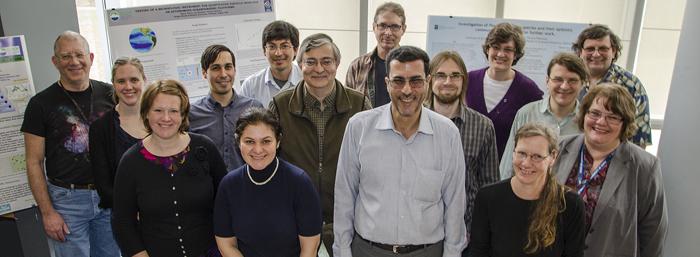- About
- Admissions
- Study at AUS
- Prospective Students
- Bachelor's Degrees
- Master's Degrees
- Doctoral Degrees
- Admission Publications
- International Students
- Contact Admissions
- Grants and Scholarships
- Sponsorship Liaison Services
- Testing Center
- New Undergraduate Student Guide
- Undergraduate Orientation
- New Graduate Student Guide
- Graduate Orientation
- File Completion
- Payment Guide
- Students with Disabilities
- Executive and Continuing Education
- Academics
- Life at AUS
- Research
- Publications
- Contact Us
- Apply Now
- .

US experience will advance gulf ecosystem research
Dr. Nabil Abdel Jabbar, professor in the Department of Chemical Engineering (CEN), has returned from seven weeks spent as part of his sabbatical leave as a visiting scholar at the Center for Coastal Margin Observation and Prediction (CMOP) in Oregon, United States. CMOP is described as "a collaborative effort of many academic and industry partners, led by Oregon Health and Science University (host institution), Oregon State University, and University of Washington." CMOP's work "characterizes complex physical and biogeochemical processes at work in river-to-ocean ecosystems and explores links between environmental and human health." During his time in Oregon he worked on CMOP's computational models and observation network. CMOP is directed by Dr. Antonio Baptista, who leads the modeling team and who also hosted Dr. Abdel Jabbar on his visit.
The visit, says Dr. Abdel Jabbar, was "very fruitful and allowed me to gain knowledge which we will be able to transfer to AUS." A key aspect of his research was to work on a model of the water circulation of the Arabian Gulf, the development of which will, he anticipates, have a positive impact on the country and region. AUS collaboration with CMOP is set to continue: "CMOP computational facilities can be accessed remotely, and the goal is to develop the foundation for a high-resolution model that AUS coastal researchers could progressively maintain as an operational forecasting system. The work would involve forecasting operations, from automated harvesting of tidal, ocean, and atmosphere forcing, to scheduling of simulations and assessment and visualization of results."
Dr. Abdel Jabbar's time at CMOP will also enable him to contribute to the mission of the university's Gulf Ecosystems Research Center (GERC), part of the work of which will be to monitor and conduct research on ecosystems. GERC aims to offer advice on long-term solutions to a number of ecological problems: "The development of Arabian Gulf models would help with prediction, for example, of red tides which disrupt the processes of desalination of water for drinking and agricultural purposes. By using modeling to predict when a red tide will occur, we may be able to prevent damage to the water processing plants filtering membranes that filter the salt water."
At CMOP Dr. Abdel Jabbar also worked with a three-dimensional simulation circulation model for the Columbia River-Pacific Ocean continental shelf off the Oregon and Washington coasts.
This, he says, "was based on a case study of an ocean shelf model simulation, with the goal being to improve the parallelization of the computer software SELFE code and enable significant spatial refinement of computational grids."
At CMOP Dr. Abdel Jabbar was particularly impressed by the quality of teamwork and the level of supportiveness that he experienced, as well as the Center's facilities and resources: "The diversity of the oceanography work that the team carries out is amazing, as is the multidisciplinary nature of the research. It is an outstanding center in terms of the skill and dedication of the scientists and researchers who work there."

